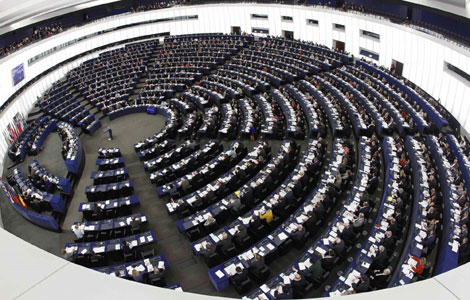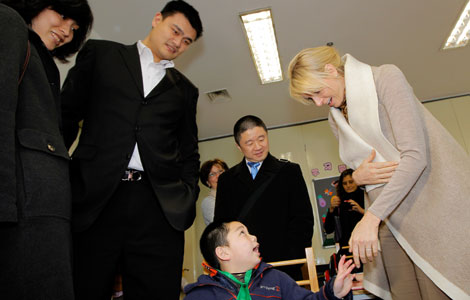 |
|
|
|
|||||||||
Editor's note: There's no better time to raise questions than the NPC/CPPCC sessions, which bring together China's top policymakers. China Daily asks experts from different countries what they wish they could ask the members and deputies about topical issues. Reporters Wang Xiaotian and Xie Yu gather the answers.
Eswar Prasad, the Tolani senior professor of trade policy at Cornell University and a senior fellow at the Brookings Institution, would like to ask how China can maintain momentum on market-oriented reforms.
China needs to make overall arrangements from the top level to promote economic reforms to cross the "deep water", said Li Yining, deputy director of the economic committee of the Chinese People's Political Consultative Conference.
|
'Give state more say' Private entrepreneurs said State-owned capital should have a bigger role in the nation's strategic industries, in response to a recent World Bank report that urged China to speed up reform in State-owned enterprises. State-owned companies' problems weren't generated by the type of ownership structure, they said on the sidelines of the National People's Congress in Beijing on Monday, and a completely "free market" approach doesn't fit the current Chinese economic profile. "Private companies and State-owned companies cannot be separated. To privatize State-owned companies won't do the Chinese economy any good," said Yang Tianfu, chairman of Harbin Electric, a Nasdaq-listed maker of electric motors. The reason some of China's State-owned enterprises are not very well managed, Yang added, is that they are too big. Xiang Wenbo, president of Sany Heavy Industry, China's largest construction equipment group, said that privatization would benefit only a few people and result in an inequitable distribution of public resources. "State-owned capital is essential for many emerging strategic industries," Xiang said. A report released last month by the World Bank and a Chinese government research organization warned that economic growth in China is likely to diminish over the next few decades unless the country completes the transition to a market economy and reduces the power of State-owned companies. Gao Changxin |
The current economic development has been much different from the years when the late leader, Deng Xiaoping, delivered his speech during his tour of South China, so the old ways China used years ago need to be changed, he said.
"It is not like crossing the river by feeling the stones. Today the water is too deep for us to touch any stones."
If economic reform is carried out properly and potential is released, China will be capable of maintaining an 8 percent growth in GDP for another 20 years, said Zheng Xinli, deputy director of the CPPCC's economic committee and former deputy director of the Communist Party of China's Policy Research Office.
Zheng said although the country lowered its expectation for GDP growth this year, it does not mean that the potential for economic growth has been lowered. China still has great potential in market demand, capital, technology innovation, labor and land.
"Reforms should be carried out in the financial system, to better support small and medium-sized enterprises," Zheng said, adding that it is a must to adopt interest-rate liberalization and allow private capital to set up financial institutions.
Both are unlikely to happen this year, he said, adding that economic reform faces big resistance from interest groups.
Jia Kang, director of the Ministry of Finance's fiscal science research center, said this year the government will work on more detailed measures to support long-term reform plans.
"Only scientific and detailed policies that are well designed could restrict some interest groups from countering implementation of the ongoing fiscal and financial reforms, as well as limiting excessive monopoly," Jia said.
"Whether China can avoid a hard landing and escape the middle-income trap is solely conditional on the pace of structural reforms. The more China delays, the less leeway China will have," said Yao Wei, China economist at the French bank, Societe Generale SA.
For 2012, an absence of infrastructural investment stimulus would be a grand gesture of reform, while game-changing moves, such as interest-rate liberalization or floating the yuan, may wait until after the political transition, she said.
Yao added that further developing the bond market, strengthening stock market regulation, reducing tax burdens on private investors and opening up more sectors to private capital are all likely to make some meaningful progress.
Li Rongrong, the former chairman of the State-owned Assets Supervision and Administration Commission, said the government needed solid resolve and courage to promote economic reform, and to realize what it had vowed to do through effective supervision and audit measures.
"The key to China's economic reform, especially lowering the threshold for private capital, lies in administration in accordance with law," said Wei Yingning, vice-chairman of China Insurance Regulatory Commission.
"For example, if a government branch prevented a private company from entering a certain area and the branch's decision was not supported by law, would there be an efficient way for the company to sue successfully?"
Lan Lan contributed to this story.
Wu Ying, iPad, Jeremy Lin, Valentine's Day, Real Name, Whitney Houston, Syria,Iranian issue, Sanyan tourism, Giving birth in Hong Kong, Cadmium spill, housing policy

|

|

|

|

|

|